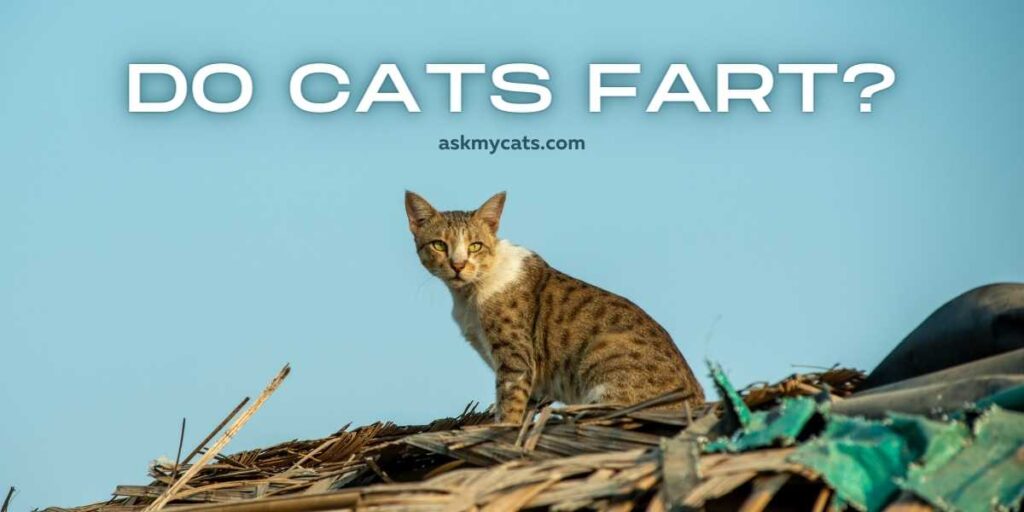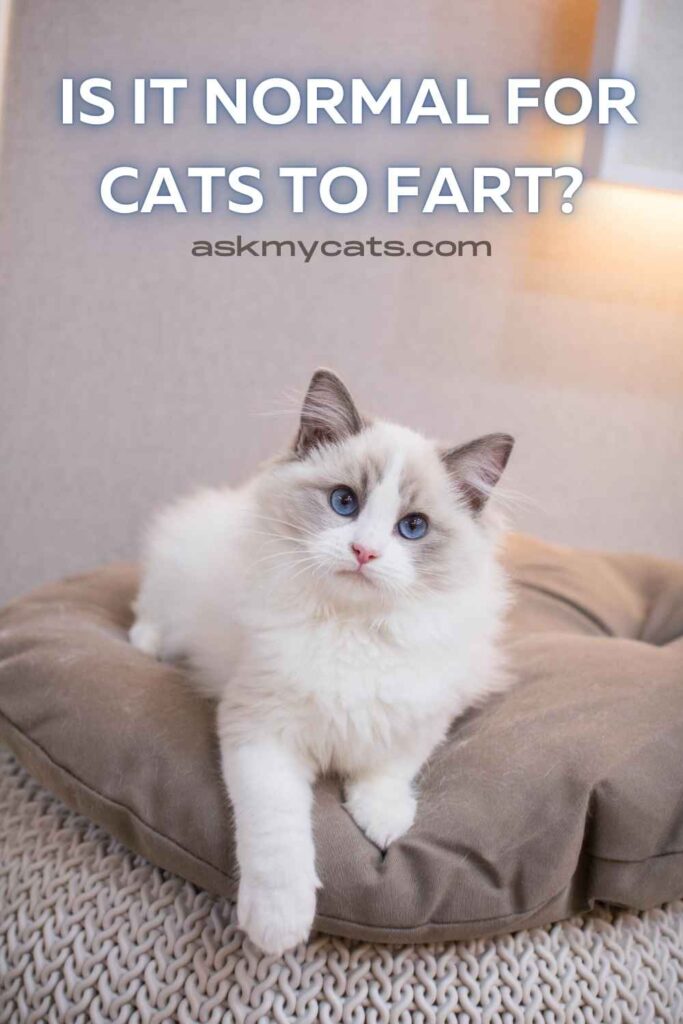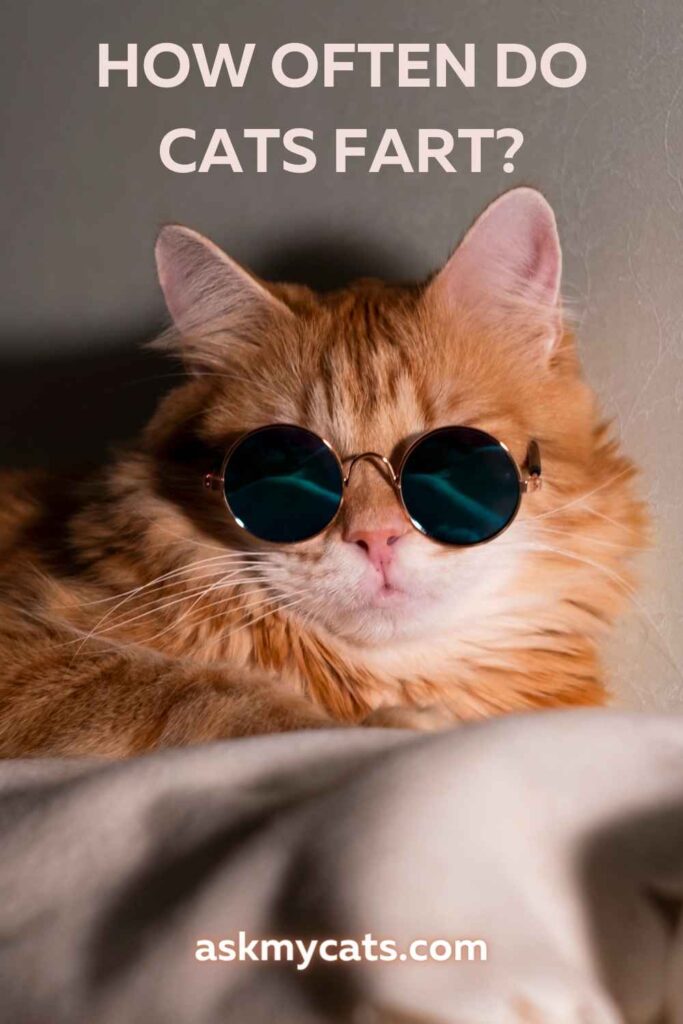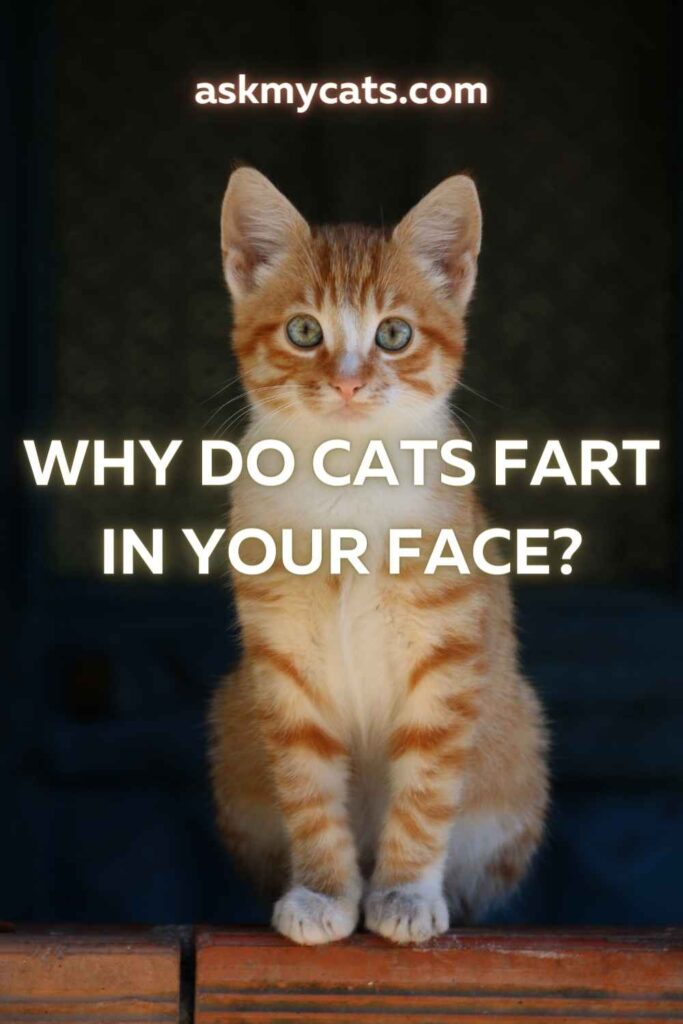Cat farts are a vital issue for pet parents to understand, even if it’s not the ideal topic to wake up to or search for on the Internet.
Excess gas in a cat’s stomach or intestines is referred to as flatulence. Flatulence is more prevalent in dogs than in cats, however, cats can have gas if their food ferments in their digestive tract, if they swallow air after eating too quickly or too much, or if they have a stomach, or small intestine, or colon disease.
A small amount of gas is a normal part of the digestive process and normally goes away soon.
Excessive gas, on the other hand, particularly if it is foul-smelling and accompanied by other symptoms, may signal that something is wrong with your cat’s digestive system.


Give Your Cat the Perfect Day
Get the Free Ebook!
Is It Normal For Cats To Fart?

Everyone has heard the classic joke about blaming other people in the room for a stinky fart. But what if the true perpetrator was your cat?
Do cats pass gas as well?
Yes, the answer is yes. Cats do have gas. A cat, like many other animals, contains gases inside its digestive tract, and this gas exits the body through the rectum.
Cats normally pass gas softly and without much odor. However, cats might experience extreme bloating, pain, and foul-smelling gas on occasion.
In that situation, your cat should see a veterinarian to get to the bottom of the problem.
Flatulence is caused by a buildup of gas in the digestive system, which is then expelled from the body. Cat flatulence is usually caused by your cat swallowing too much air, but it can also be caused by allergies or diet.
Allergies to dust, pollen, and pests like ticks and fleas can also induce digestive problems including vomiting, gas, and diarrhea.
Flea allergies are relatively normal, according to the Cat Hospital, but if these symptoms are severe, see your veterinarian before providing any therapy.
Gas Symptoms in Cats
Gas symptoms might be rather plain at times. When your cat releases gas, you can hear or smell it.
Other gas symptoms are milder. When you pet your cat, for example, you may notice that their tummy seems swollen. Your cat may refuse to be touched at all. Because of their discomfort, they may be less playful than normal.
In cats, gas might be hidden by other indications of gastrointestinal trouble. They might be suffering diarrhea or vomiting, which will mask the presence of gas.
When you examine the litterbox, you may detect blood in your cat’s feces in some circumstances. A cat with severe stomach pain may refuse to eat or drink.
If this occurs, you should contact your veterinarian as soon as possible to schedule a visit.
What Triggers Cats to Pass Gas?
There are various reasons why a kitten can have some excess gas now and again. Some causes of cat gas are simple to explain, and you can cure these issues at home.
Eating food that the cat dislikes. Cats must consume a suitable diet to avoid stomach distress and flatulence. Foods heavy in fiber or too much red meat are examples of foods that cause gas in cats. Eating rotten food or waste can also cause gas. Many cats are unable to digest dairy products, which causes them to vomit.
Eating too much or too quickly. Cats who devour a lot of food fast may take in a lot of air while doing so. Some cats get stomach discomfort and flatulence as a result of this.
Food allergies can occur in cats. Food allergies may occur in cats at any stage of their lives. They can even develop allergies to items they’ve consumed for years. Most cats with food allergies show skin symptoms, but many also have gastrointestinal issues such as diarrhea and sometimes flatulence. Your veterinarian can assist you in determining food allergies.
Although if the problem of gas still prevails, here’s an insight into it
Gas in Cats Diagnosis
When you notice a variation in your cat’s normal flatulence, the next step is to get them inspected by a veterinarian. Initially, your veterinarian will request a complete medical history.
Eating habits and certain foods might assist identify the source of your cat’s flatulence. As a result, it is critical to keep track of what your cat eats, when they consume it, and how much.
Furthermore, your veterinarian may arrange a hypoallergenic diet trial to evaluate whether food allergies are to blame.
If the condition looks to be caused by a more serious consequence, such as an illness, your veterinarian will prescribe additional diagnostic testing.
For example, if parasites are suspected, your veterinarian will request stool samples, which are extremely important in disclosing any worms.
There are a few further tests that your veterinarian may order. Urinalysis, complete blood count (CBC), biochemical profile, and abdominal X-rays are a few examples.
You might like to read How To Choose Best Cat Food For Gassy Kitten
Do Cats Fart Smell?
Cats do fall under the silent deadly category of farters!
Cats are carnivores who eat largely protein-rich foods. This diet creates a lot of smelly gas because proteins include a lot of sulfur, which is a highly odorous molecule.
Cat farts are typically silent, but the stink is terrible. Because the amount of gas they release is substantially smaller, yet thick and highly concentrated, their farts are barely audible.
Cats produce gas slowly and steadily because their gastrointestinal system has little internal pressure.
If cats fart loudly, it might be a sign of pathology.
So, the next time you smell something nasty but can’t figure out what it is, remember this. Check with your cat to see if he has to go potty:-).
You might also like to check why do cats fart smell so bad
How Often Do Cats Fart?

It seems like a strange subject, but because we don’t typically see cats seeming ashamed about their excretion habits (perhaps something we humans can learn from), it’s something that many pet owners wonder, discuss, and consult their veterinarians about:
Do my cats fart, and how frequently do cats fart?
It’s difficult to say!
According to the NHS, the average person toots five to fifteen times each day; but, where do cats stand—or toot—in comparison?
“It’s difficult to explain accurately,” Dr. Pilossoph says. It all comes down to food, how much air is inhaled, and a variety of other factors.
Cats don’t usually let us know when they’re passing gas, and they’re not surprised or embarrassed by it. And because most cat farts are odorless, no one will ever notice.
The best estimate is that they do it as frequently as healthy humans do, which is many times each day on average.
However, there are several factors that influence how frequently cats fart and how much it stinks when they do.
Can Cats Make Fart Noises When They Fart?
Cats, like most mammals, do fart.
Cats fart audibly. However, the volume is modest. That is, it is not as loud as a human fart.
The amount of air released from their anus contributes to their inability to hear. Because of the way cats consume, this gas is usually modest. In other words, they don’t normally take in a lot of air when eating.
Flatulence occurs as a result of eating; when our systems attempt to digest food, gas builds up in our bodies (and cats’ bodies), whether owing to too much-ingested air, partially digested carbohydrates, or bacterial overgrowth.
That gas buildup has to go someplace, right? As a result, it finally enters the digestive tract and leaves through the rectum.
The same thing happens to cats, although it’s typically a quiet procedure. Cat farts are usually silent, but they stink. While it is not necessarily prevalent (at least not in a noticeable way), it does occur.
Most of the time, you won’t even notice your cat farting because it doesn’t produce much odor or create a discernible sound.
Your cat, can and will fart loudly and proudly at times. You might not be present to hear it and offer testimony. Other times, the noxious odor may develop.
You might also like to read Why Does My Kitten Fart So Much?
Why Do Cats Fart In Your Face?

Cats exhibit a wide range of unusual habits. They despise being wet. A “blep” occurs when their tongues become stuck halfway out of their mouths.
Some of these characteristics can be explained, while others remain a mystery. For example, when they thrust their rear end in your face and make you obese for no apparent reason.
Is it only to humiliate their helpless carers that cats do this? What drives a cat to welcome a person with its buttocks? Why degrade the person who provides you with food and shelter?
Cat does not fart in your face on purpose. It usually happens naturally, but Cats may fart in your face in order to expel extra air from their digestive tract.
However, it occurs less frequently than in other species, such as dogs.
“It’s natural for cats to smell one other’s buttocks to say hello or confirm other cat’s identity,” Delgado explained. “It’s difficult for people to understand, but this behavior is significant to cats because it’s how they recognize each other.” So cats may be ‘inviting’ us to come to check them out, or simply saying hello.”
Presenting or scrutinizing a butt is like a fingerprint scan for a cat. It’s a biological security measure.
Because cats are unaware of the release of this stinky natural gas and it is not something to be embarrassed about in the cat world, they are most frequently misinterpreted by cat owners, so don’t worry, your kitty is only trying to say hello.
Do cats fart when they are happy?
Yes. When cats are pleased and comfortable, they may fart. The cat is an extremely aware animal. They are always aware of their surroundings. When the cat is comfortable and satisfied after dinner, he or she may fart.
It’s impossible to argue that cats only fart when they’re happy. None of the species are able to manage their digestive systems.
The same is true for the cat. When gas is produced in the stomach, it is expelled after a few hours. So, regardless of the cat’s mood, the gas will be released when the time comes. So it would be incorrect to claim that your cat only farts when it is happy.
You might also like to check Do Cats Fart When They Are Scared, Excited, Or Happy?
What can I do to keep my cat from farting in my face?
To stop your cat from farting in your face, you must address the core cause of the problem, which is what is causing it to fart. So, in this section, let us look into some ideas for it :
1. Altering your cat’s diet
One of the most typical problems is your cat’s food. This farting response might be caused by a single chemical that disagrees with them. So it’s not an exact science, but you should experiment with different foods.
The plan is to change part of its meals and watch how it reacts. This might be as simple as replacing wet food A with wet food brand B.
Unfortunately, you must experiment to see how your cat reacts. Why? There is, however, no one-size-fits-all remedy for this. Each cat is unique. Are you on board?
2. Seeking medical help for any health problems
To be safe, if your cat has additional health conditions such as parasites or other digestive health disorders, you should get guidance from your veterinarian.
Because your cat may require medicine or other assistance. It’s also not worth wasting time at home speculating.
Do Cats Fart More When Pregnant?
While it is true that pregnant cats fart more than non-pregnant cats, your cat might also be infected with worms.
There are several reasons why a cat farts smell so awful and sometimes deadly, but if your cat is pregnant she might be passing this stinky gas more than usual for our cat to get pregnant it is evident that she has traveled outside the house and might have picked up some illnesses and hence the deed of farts, these illnesses might cause some digestive problems or present itself as worms or any other intestinal problem, this is a sign of concern and should be given importance to because our cat is now a mother carrying a baby and it might be harmful to the both of them.
We recommend that you consult with your veterinarian; a stool sample may disclose the solution.
More details: Pregnant Cat Farting A Lot: Reasons & Solutions
Frequently Asked Questions
Do worms cause gas in cats?
Yes, intestinal parasites (worms) can cause gas and flatulence in cats.
Why is my cat bloated and gassy?
Organ growth, fluid or a lump in the belly, intestinal parasites, and weight increase are all possible reasons for a big belly in a cat or kitten.
Why is my cat suddenly so gassy?
Cat flatulence is usually caused by your cat swallowing too much air, but it can also be caused by allergies or diet. Allergies to dust, pollen, and pests like ticks and fleas can also induce digestive problems including vomiting, gas, and diarrhea.
Final Words
Flatulence is caused by a buildup of gas in the digestive system, which is then expelled from the body.
Cat farts are typically silent, but the stink is terrible. Cat flatulence is usually caused by your cat swallowing too much air, but can also be caused by allergies or diet.
Cats fart in your face to expel extra air from their digestive tract. Flea allergies are relatively normal, but if symptoms are severe, see your veterinarian.
